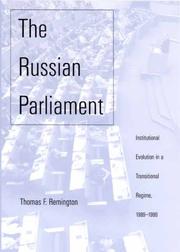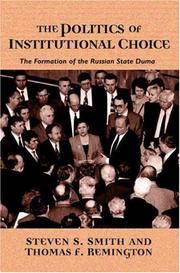| Listing 1 - 2 of 2 |
Sort by
|

ISBN: 0300084986 0300129769 9780300129762 9780300084986 128173053X 9781281730534 9786611730536 Year: 2001 Publisher: New Haven : Yale University Press,
Abstract | Keywords | Export | Availability | Bookmark
 Loading...
Loading...Choose an application
- Reference Manager
- EndNote
- RefWorks (Direct export to RefWorks)
From the first free elections in post-Soviet Russia in 1989 to the end of the Yeltsin period in 1999, Russia's parliament was the site of great political upheavals. Conflicts between communists and reformers generated constant turmoil, and twice parliamentary institutions broke down in violence. This book offers the first full account of the inaugural decade of Russia's parliament. Thomas F. Remington, a leading scholar of Russian politics, describes in unique detail the Gorbachev-era parliament of 1989-91, the interim parliament of 1990-93, and the current Federal Assembly.Focusing particularly on the emergence of parliamentary parties and bicameralism, Remington explores how the organization of the Russian parliament changed, why some changes failed while others were accepted, and why the current parliament is more effective and viable than its predecessors. He links the story of parliamentary evolution in Russia to contemporary theories of institutional development and concludes that, notwithstanding the turbulence of Russia's first postcommunist decade, parliament has served as a stabilizing influence in Russian political life.
Representative government and representation --- #SBIB:324H40 --- #SBIB:328H262 --- Politieke structuren: algemeen --- Instellingen en beleid: Rusland en het GOS --- Russia (Federation). --- Gosduma (Russia : 1993- ) --- Russian State Duma (Russia : 1993- ) --- Duma (Russia : 1993- ) --- Gosudarstvennai︠a︡ Duma Rossiĭskoĭ Federat︠s︡ii --- Gosduma FS RF

ISBN: 0691057362 0691057370 1400814715 1400823943 140081815X Year: 2001 Publisher: Princeton (N.J.) Princeton university press
Abstract | Keywords | Export | Availability | Bookmark
 Loading...
Loading...Choose an application
- Reference Manager
- EndNote
- RefWorks (Direct export to RefWorks)
Events in Russia since the late 1980s have created a rare opportunity to watch the birth of democratic institutions close at hand. Here Steven Smith and Thomas Remington provide the first intensive, theoretically grounded examination of the early development of the State Duma, the lower house of the Russian Federation's parliament created by the 1993 constitution. They offer an integrated account of the choices made by the newly elected members of the Duma in establishing basic operating arrangements: an agenda-setting governing body, a standing committee system, an electoral law, and a party system. Not only do these decisions promise to have lasting consequences for the post-communist Russian regime, but they also enable the authors to test assumptions about politicians' goals from the standpoint of institutional theory. Smith and Remington challenge in particular the notion, derived from American contexts, that politicians pursue a single, overarching goal in the creation of institutions. They argue that politicians have multiple political goals--career, policy, and partisan--that drive their choices. Among Duma members, the authors detect many cross currents of interests, generated by the mixed electoral system, which combines both single-member districts and proportional representation, and by sharp policy divisions and an emerging party system. Elected officials may shift from concentrating on one goal to emphasizing another, but political contexts can help determine their behavior. This book brings a fresh perspective to numerous theories by incorporating first-hand accounts of major institutional choices and placing developments in their actual context.
Legislative bodies --- Representative government and representation --- Parlements --- Gouvernement représentatif --- Russia (Federation). --- Russia (Federation) --- Russie --- Politics and government --- Politique et gouvernement --- -Representative government and representation --- -#SBIB:328H262 --- #SBIB:35H6020 --- Parliamentary government --- Political representation --- Representation --- Self-government --- Constitutional history --- Constitutional law --- Political science --- Democracy --- Elections --- Republics --- Suffrage --- Bicameralism --- Legislatures --- Parliaments --- Unicameral legislatures --- Estates (Social orders) --- Legislative power --- Instellingen en beleid: Rusland en het GOS --- Bestuur en beleid: nationale en regionale studies: Oost-Europa --- Russia (Federation). Federal'noe Sobranie. Gosudarstvennai︠a︡ Duma --- -Politics and government --- -Legislative bodies --- Gouvernement représentatif --- #SBIB:328H262 --- Gosduma (Russia : 1993- ) --- Russian State Duma (Russia : 1993- ) --- Duma (Russia : 1993- ) --- Gosudarstvennai︠a︡ Duma Rossiĭskoĭ Federat︠s︡ii --- Gosduma FS RF
| Listing 1 - 2 of 2 |
Sort by
|

 Search
Search Feedback
Feedback About
About Help
Help News
News